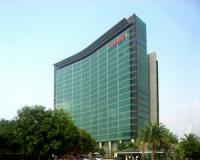-
Exelon / Clinton nuclear officers ratify their first contract with NUNSO/LEOSU

Clinton nuclear security officers working for Exelon at Clinton Power Station have voted on 8 May 2019, to ratify their first contract with the National Union of Nuclear Security Officers NUNSO / LEOSU.
-
-
The 5G fight is bigger than Huawei
The latest salvos in the Trump administration’s campaign against Huawei may prove, at best, to be a Pyrrhic victory—or, at worst, directly undermine U.S. interests and objectives. At the moment, it remains unclear how the recent executive order, which creates sweeping authorities to bar and exclude companies or technologies linked to a “foreign adversary” from the United States, and the addition of Huawei to the government blacklist known as the Entity List will be implemented in practice. Elsa B. Kania writes in Foreign Policy that it is not too late for U.S. President Donald Trump to recalibrate toward the smarter approach needed for such a complex challenge. In the process, the U.S. government should also pursue more proactive policies that concentrate on ensuring future American competitiveness in 5G, the fifth generation of mobile networks.
-
-
China raises threat of rare-Earths cutoff to U.S.
With a simple visit to an obscure factory on Monday, Chinese President Xi Jinping has raised the specter that China could potentially cut off supplies of critical materials needed by huge swaths of the U.S. economy, underscoring growing concerns that large-scale economic integration is boomeranging and becoming a geopolitical weapon. Keith Johnson and Elias Groll write in Foreign Policy that Beijing could slam every corner of the American economy, from oil refineries to wind turbines to jet engines, by banning exports of crucial minerals.
-
-
Profitable climate change solution
A seemingly counterintuitive approach – converting one greenhouse gas into another – holds promise for returning the atmosphere to pre-industrial concentrations of methane, a powerful driver of global warming.
-
-
Google cuts Huawei access to Android software updates
Google said on Sunday it was rescinding Huawei’s license to use Google’s mobile phone operating system Android, and Google services such as Google maps and YouTube. The move will force the Chinese technology company to rely on an open-source version of the software. The move follows a presidential executive order prohibiting American companies from using telecommunications equipment made by “foreign adversaries” viewed as posing a threat to U.S. national security.
-
-
Why Huawei security concerns cannot be removed from U.S.-China relations

Huawei’s role in building new 5G networks has become one of the most controversial topics in current international relations. The U.S. is exercising direct diplomatic pressure to stop states from using the Chinese telecoms giant. The U.S. government regards Huawei as a clear and present danger to national security and argues that any ally opting for Huawei will compromise vital intelligence sharing among these countries in the future.
-
-
Administration’s immigration plan prioritizes skills, merit over family
President Donald Trump is scheduled to announce his long-awaited proposal on immigration Thursday, a plan that aims to move the immigration approval process away from family-ties and humanitarian needs. Administration official said the plan will bolster border security and create a merit-based system, insisting that it is a “competitiveness issue.”
-
-
How to break our bad online security habits – with a flashing cyber nudge
The number of cyberattacks is estimated to have risen by 67 percent over the last five years, with the majority of these data breaches being traced back to human error. The potential risks of such attacks are vast and can have a serious impact on both organizations and individuals. But protecting ourselves against cyber security threats can be extremely complicated.
-
-
U.S. official: Executive order not needed to ban Huawei in U.S. 5G networks

“We have grave concerns about the Chinese vendors because they can be compelled by the National Intelligence Law in China as well as other laws in China to take actions that would not be in the interests of the citizens of other countries around the world. Those networks could be disrupted or their data could be taken and be used for purposes that would not be consistent with fundamental human rights in those countries,” says Robert Strayer, deputy assistant secretary of state for cyber and international communications and information policy.
-
-
Blockchains are being exploited by bots for profit

Blockchains have been hailed as fair and open, constructed so a single user can’t falsify or alter records because they’re all part of a transparent network. The reality is not so simple, according to new research.
-
-
Fracking Linked to earthquakes in the Central and Eastern United States
Small earthquakes in Ohio, Pennsylvania, West Virginia, Oklahoma and Texas can be linked to hydraulic fracturing wells in those regions, according to researchers. While relatively rare compared to earthquakes caused by wastewater disposal in oil and gas fields in the central United States, the researchers have identified more than 600 small earthquakes (between magnitude 2.0 and 3.8) in these states.
-
-
China: Determined to dominate cyberspace and AI
China is chasing dominance in emerging artificial intelligence (AI) technologies in both the private and military sectors, as a central part of its effort to be the leading global cyber power, Chris C. Demchak writes in the Bulletin of the Atomic Scientists. The rise of AI – a subset of cyber as are machine learning, quantum computing, and other new technologies – does not herald a new arms race equivalent to that of the Cold War. Rather, the concern should be on the profound disruption to the existing Westernized global order. In the 1990s, Western nations, led by the United States, created what Demchak calls a “Westernized national creation”: cyberspace. Cyberspace, however, has created a multitude of ubiquitous, embedded vulnerabilities whose easy exploitation directly accelerated the rise of an otherwise impoverished authoritarian and aggressive China. Today, no single democracy has the scale and sufficient resources alone to match the foreknowledge and strategic coherence of the newly confident and assertive China. There is thus a need to create a Cyber Operational Resilience Alliance (CORA) to provide the scale and collective strategic coherence required to ensure the future wellbeing and security of democracy in an overwhelmingly authoritarian, post-Western, cybered world.
-
-
Analysts: China trying to use Belt and Road meeting to counter U.S. influence
China is getting ready to welcome representatives from 150 nations, including senior leaders of 40 countries, to discuss its international infrastructure program at the second Belt and Road Forum, beginning Thursday and running through Saturday in Beijing. Analysts say it is not merely a conference on infrastructure building, but an attempt by China to display its popularity and power as a political rallying force.
-
-
Lasting U.S. preeminence: A review of Michael Beckley’s “Unrivaled”

The Economist last year proclaimed that the “Chinese century is well under way,” and that China is on its way to replacing the United States as the new global “hegemon.” Tufts University’s Michael Beckley says: Not so fast. He argues not only that U.S. preeminence is safer than most contemporary commentary would have one believe, but also that it is more resilient: “Unipolarity is not guaranteed to endure,” he concludes, “but present trends strongly suggest that it will last for many decades.”
-
-
Actively used private keys on the ethereum blockchain facilitate cryptocurrency theft

Researchers at Independent Security Evaluators (ISE) have discovered 732 actively used private keys on the Ethereum blockchain. The researchers also found that poorly implemented private key generation is also facilitating the theft of cryptocurrency.
-
More headlines
The long view
If Trump Wants More Deportations, He’ll Need to Target the Construction Industry
As President Donald Trump sends mixed messages about immigration enforcement, ordering new raids on farms and hotels just days after saying he wouldn’t target those industries, he has hardly mentioned the industry that employs the most immigrant laborers: construction. Almost a quarter of all immigrants without a college degree work in construction.
Federal R&D Funding Boosts Productivity for the Whole Economy − Making Big Cuts to Such Government Spending Unwise
Large cuts to government-funded research and development can endanger American innovation – and the vital productivity gains it supports. If the government were to abandon its long-standing practice of investing in R&D, it would significantly slow the pace of U.S. innovation and economic growth.
Smaller Nuclear Reactors Spark Renewed Interest in a Once-Shunned Energy Source
In the past two years, half the states have taken action to promote nuclear power, from creating nuclear task forces to integrating nuclear into long-term energy plans.
